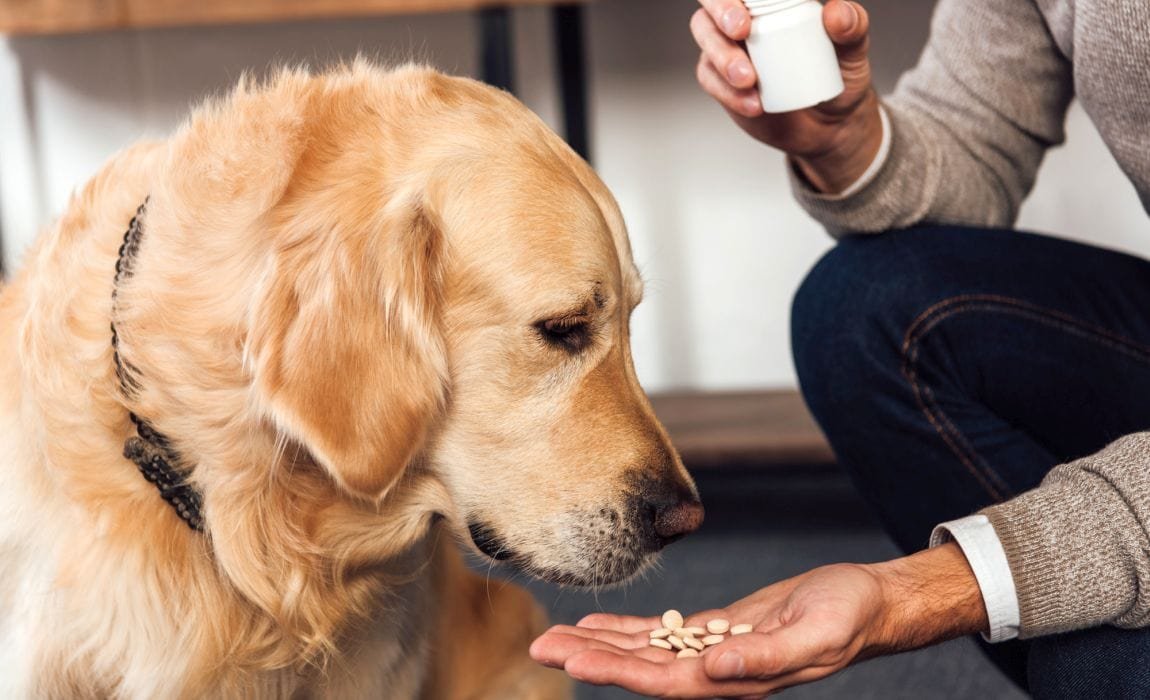What Are the Health Benefits of Feeding Raw Eggs to Dogs?

Are you wondering if it’s safe to share your breakfast omelette with your pup? While you may have heard that eggs are a great source of nutrition, you may be wondering if it’s okay to feed your four-legged friend raw eggs. The truth is, while there are some potential benefits to feeding your dog raw eggs, there are also risks that come with it. In this blog, we’ll explore all the pros and cons of feeding your dog raw eggs, as well as tips on how to do it safely.
Benefits of Raw Eggs for Dogs
Raw eggs can be beneficial for dogs when fed in moderation. They are an excellent source of protein, amino acids, vitamins, and minerals. While some pet owners may be concerned about giving their dogs raw eggs due to the risk of salmonella, the risk is very low and can be easily managed by following a few simple guidelines. Raw eggs are a great source of nutrition for dogs. They are packed with high-quality proteins and healthy fats, as well as vitamins and minerals such as vitamin A, B-complex, D, and E, riboflavin, biotin, and folic acid.
Egg yolks are also a great source of choline, which helps with liver function, vision, and brain development. There are some risks associated with feeding raw eggs to dogs, such as the risk of salmonella contamination. However, this risk can be easily managed by ensuring that the eggs are thoroughly washed and stored at a temperature below 40 degrees Fahrenheit. Additionally, it is important to feed only fresh eggs and to discard any eggs that appear cracked or discolored. When feeding raw eggs to your dog, it is important to consider the size and breed of your pet.
Smaller dogs, such as toy breeds, may require less egg than larger breeds. Additionally, puppies should not be given raw eggs until they are at least three months old. Overall, raw eggs can be a great addition to your dog’s diet. They are an excellent source of nutrition and can help to promote healthy skin and coat, strong bones, and overall good health. As long as proper safety precautions are taken, feeding your dog raw eggs can be a safe and beneficial choice.
Protein Content
If you’ve ever wondered whether it’s safe to feed your pup raw eggs, you’ll be glad to know that they can indeed enjoy the health benefits of raw eggs. Raw eggs are an excellent source of protein and offer essential fatty acids, vitamins, and minerals that can help keep your canine companion healthy and happy. However, it’s important to make sure the eggs you feed your pup are fresh, and that you take the proper safety precautions when handling them. Additionally, it’s best to feed your pup raw eggs in moderation, as too much can lead to digestive issues or an upset stomach.

Healthy Fats
When it comes to your pup’s health, incorporating healthy fats into their diet is an important part of making sure they stay happy and healthy. One of the most nutritious sources of healthy fats for dogs is raw eggs. Not only are raw eggs a great source of protein, but they also provide essential fatty acids, vitamins, and minerals. However, before you start feeding your pup raw eggs, it’s important to remember that they can contain Salmonella and other bacteria, so it’s best to consult with your vet to make sure it’s safe for your dog to eat raw eggs.
Vitamins and Minerals
Vitamins and minerals are essential for our canine companions, but when it comes to raw eggs, it’s best to proceed with caution. While some owners prefer to feed their dog raw eggs, it’s important to understand the potential risks associated with feeding them. Raw eggs can contain bacteria such as Salmonella, which can cause food poisoning in dogs. Additionally, raw egg whites contain avidin, an enzyme that can interfere with biotin absorption. The good news is that dogs can benefit from cooked eggs as a dietary supplement, providing them with essential proteins, vitamins, and minerals.
Remember, always consult with your vet before making any changes to your pup’s diet.
Potential Risks of Feeding Raw Eggs
Raw eggs are an ingredient that many pet owners are interested in feeding their dogs, as they are a natural source of protein, vitamins, and minerals. However, there are some potential risks associated with feeding raw eggs to dogs that pet owners should be aware of. Raw eggs can contain bacteria such as salmonella, which can be dangerous for humans and animals alike. This bacteria can easily spread from the raw egg to other foods, surfaces, and even the people or animals that handle the raw egg. This can result in food poisoning, which can be very serious for both humans and dogs.
In addition to the potential bacterial contamination, raw eggs can also contain an enzyme known as avidin. Avidin can interfere with the absorption of biotin, a B vitamin that is important for healthy skin and coat. If a dog is fed a diet that is high in raw eggs, they may develop a biotin deficiency, which can cause problems with their skin and coat. It’s also important to remember that raw eggs contain high levels of cholesterol, which can be unhealthy for dogs. Dogs that are fed a diet high in raw eggs may be at risk for developing heart problems.
Finally, raw eggs often contain parasites, such as roundworms, which can be harmful to dogs. These parasites can cause vomiting, diarrhea, and other digestive issues. Overall, it is not recommended that dogs eat raw eggs as part of their regular diet. If a pet owner does decide to feed their dog raw eggs, it is important to take appropriate safety precautions, such as washing their hands thoroughly after handling the raw egg, and washing any surfaces that the raw egg has come into contact with. It is also important to make sure that the eggs are from a reputable source, as eggs from unhealthy hens may contain high levels of bacteria or parasites.
Possibility of Salmonella
When it comes to feeding your furry friends raw eggs, it’s important to be aware of the potential risks. The biggest concern is the potential contamination of Salmonella, a bacterium that can cause serious illness in both humans and dogs. While there is always a possibility of Salmonella in raw eggs, proper handling can help reduce the risk. Make sure to purchase eggs from a reliable source and store them in the refrigerator until you are ready to use them. Additionally, wash your hands, the bowl, and utensils thoroughly after feeding your pup raw eggs.
Lastly, be sure to cook the eggs before feeding them to your pup, as this will kill any potential Salmonella bacteria. By following these steps, you can help ensure that your pup has a safe and nutritious meal!

Raw Egg White Ingestion
Raw eggs can be a healthy part of a dog’s diet, but it is important to be aware of when your pup can safely eat them. Raw egg whites contain a protein called avidin which can interfere with the absorption of biotin, an essential vitamin for your pup’s coat and skin health. Because of this, it is recommended that puppies and adult dogs eat raw egg whites no more than once a week. However, if you are looking to increase the protein in your pup’s diet, you can give them raw egg yolks more often as they do not contain avidin. When feeding your pup raw eggs, make sure you buy them from a reputable source and give them a thorough wash before serving.
Possibility of Biotin Deficiency
Our furry friends are known to love their treats, but did you know that raw eggs can be a great source of biotin for dogs? Biotin is a vitamin found in egg yolks that helps keep skin and fur healthy, but it can also be a source of deficiency if not properly managed. Knowing when it is safe to give your dog raw eggs can help ensure a healthy, happy pup! Raw eggs should not be given to puppies or dogs with compromised immune systems, as salmonella is a risk. If your dog is otherwise healthy and not allergic to eggs, you can feed them one to two raw eggs per week. Make sure to cook the egg whites, as they contain avidin which can bind to biotin and make it unavailable for absorption by your pup. Adding raw eggs to your pup’s diet can help to prevent biotin-deficiency-related problems such as dry, flaky skin and thinning fur.
Serving Suggestions for Raw Eggs
If you’re a pet parent, you may be wondering when can dogs eat raw eggs safely. Many people are hesitant to give their furry friends raw eggs due to the potential for food poisoning, but the truth is that raw eggs can offer a wealth of nutritional benefits for your pup. With a few precautions, you can safely add raw eggs to your pup’s diet. Raw eggs contain a mixture of essential proteins and fats that are essential for your pup’s overall health. They are an excellent source of vitamins and minerals, providing your pup with an abundance of essential vitamins such as B12, D, E and K, minerals such as zinc and iron, and fatty acids that are important for healthy skin and coat.
It’s important to note that it’s not recommended to feed your pup raw eggs every day. Too much of any one food can be unhealthy and raw eggs can contain Salmonella, so it’s important to be careful when feeding your pup raw eggs. You should also keep in mind that raw eggs should never be cooked, as this can destroy their nutritional value. When feeding your pup raw eggs, it’s important to make sure they are well-washed and unbroken. You should also inspect the eggshells carefully for any signs of cracking or contamination.
If you are concerned about Salmonella, you can also opt for pasteurized eggs which have been heated to a temperature that kills any potentially harmful bacteria. When feeding your pup raw eggs, you should always start with a small amount and observe them for any signs of digestive upset. If your pup seems to tolerate the raw egg, you can gradually increase the portion size. As with any food, it’s important to monitor your pup’s reaction and adjust the portions accordingly. When it comes to serving raw eggs to your pup, there are a few important things to keep in mind.
Always use fresh eggs, as older eggs can contain bacteria that can cause food poisoning. Also
How to Feed Raw Eggs
Giving your pup a raw egg every once in a while can be a great way to boost their nutrition, but you need to be careful when doing so. Raw eggs contain high amounts of protein and other essential vitamins and minerals that can benefit your dog’s overall health, including healthy skin and coat, stronger muscles, and improved digestion. However, there are some risks associated with feeding raw eggs, such as potential bacterial contamination, so it’s important to consider when your pup can safely consume them. Generally, it’s recommended that dogs eat raw eggs no more than once a week. Additionally, you should always make sure to thoroughly clean any bowls or utensils used to feed raw eggs to avoid potential contamination.
Serving Size Recommendations
One of the most frequently asked questions when it comes to feeding our furry friends is “When can dogs eat raw eggs?” The answer is actually quite simple: there is no definitive answer. While some pet owners have reported success in feeding their dogs raw eggs, the truth is that the risks associated with raw egg consumption might outweigh any potential benefits. For example, raw eggs can contain Salmonella bacteria which can cause gastrointestinal upset and other health issues in our canine companions. Therefore, it is best to err on the side of caution and feed your pup cooked eggs instead. Additionally, be sure to follow your veterinarian’s serving size recommendations for a balanced diet and optimal health.
Conclusion
Raw eggs can be a healthy, protein-packed snack for your pup – just make sure to keep them in moderation and always consult your vet before adding anything new to your dog’s diet!”
FAQs
When can dogs eat raw eggs?
Dogs should never eat raw eggs as it can lead to biotin deficiency. Biotin is an important nutrient for dogs and raw eggs contain a protein that binds to biotin, preventing its absorption.




